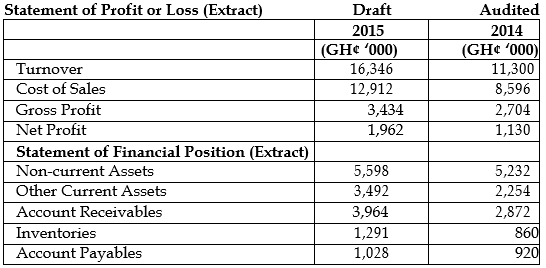Nov 2016 Q2 b.
Ghana Sugar Company Limited a private company has been in operation for many years. Owing to a rising need to raise additional capital the shareholders have passed a resolution to convert the company into a public company and list it on the Ghana Stock Exchange. You have been contracted to help the Directors to carry the resolution through. During your preliminary discussion with the Directors you realised that they were not very conversant with the listing rules of the Ghana Stock Exchange and you drew their attention to the establishment of an Audit Committee as a condition for listing on the Ghana Stock Exchange.
The Directors agreed to discuss the establishment of the Audit committee at the next emergency meeting and invited you to be present.
Required:
Recommend the composition of the audit committee and describe its responsibilities to the Directors. (10 marks)
View Solution
An Audit committee is a sub-committee of the board of Directors which is mandated to help the main board to discharge its responsibilities in the area of achieving effective and transparent financial reporting. To play an independent role the audit committee should be composed of at least three and maximum of five members, majority of whom should be non-executive directors. Whiles the members are not required to be accounting and financial professionals they should have sufficient knowledge and experience in financial matters, especially financial reporting requirements.
While these executives of the company cannot be members of the committee, they can be in attendance at meetings.
1) The Chief executive officer
2) The financial director or chief financial or accounting officer
3) Head of internal audit
The external auditor may also be invited when necessary to attend a meeting of the committee.
Responsibility of an audit committee
The main role and responsibilities of the audit committee are as follows:
1) To monitor the integrity of the financial statements of the company and any formal announcement relating to the company’s performance, reviewing significant financial reporting judgements contained in them.
2) To review the company’s internal financial controls and, unless expressed addressed by a separate board risk committee composed of independent directors or by the board itself, to review the company’s internal control and risk management systems.
3) To monitor and review the effectiveness of the company’s internal audit function.
4) To make recommendations to the board, for it to put to shareholders for their approval in general meeting , in relation to the appointment, re-appointment, and removal of the external auditor and to approve the remuneration and terms of engagement of the external auditor.
5) To review and monitor the external auditor’s independence and objectivity and the effectiveness of the audit process taking into account relevant professional and regulatory requirements.
6) To develop and implement policy on the engagement of the external auditor to supply non-audit services, taking into account relevant ethical guidance regarding the provision of non-audit services by the external firm and to report to the board identifying any matters in respect of which it considers that action and improvement is needed and making recommendations as to steps to be taken.
7) To report to the board how it has discharge it responsibilities, including
- How it has addressed significant issues arising in the financial statements
- How it has addressed the effectiveness of the audit process
- How auditors objectivity and independence is safeguarded, where the auditor provided non-audit services. (Any 5 points for 5 marks)

